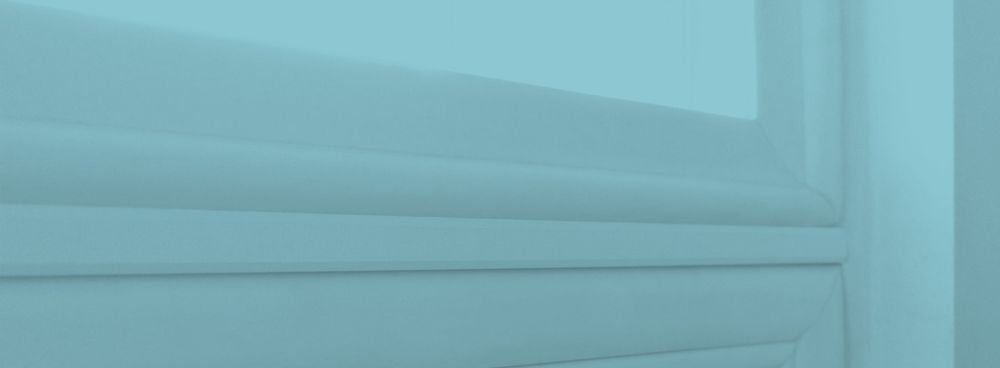
Most Effective Soundproofing Materials
The most effective soundproofing materials depends on where you are trying to soundproof and what noise you are trying to soundproof. How do you use the space and how does noise impact your use of it? There are different processes for how to soundproof a room for music vs how to soundproof a home office.
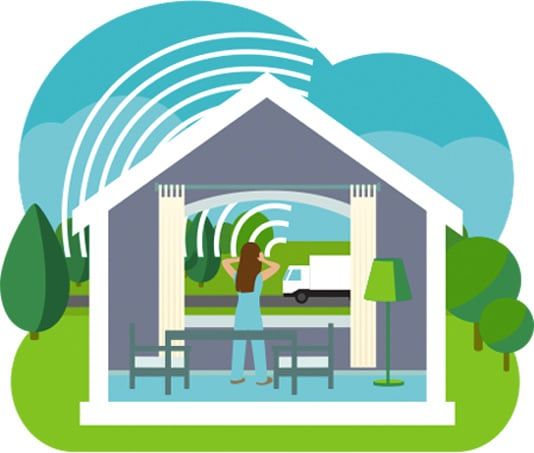
The Two Types of Soundproofing
First, a disclaimer: you can't completely soundproof a space as long as there is air. Anywhere air goes, sound goes too because sound travels via air.
There are two types of soundproofing:
Sound reduction , which stops sound from entering a space. Sound reduction will help keep your space free outside noises such as weather, outdoor conversations, and traffic.
Sound absorption, which stops sound already inside a space from echoing and reverberating.
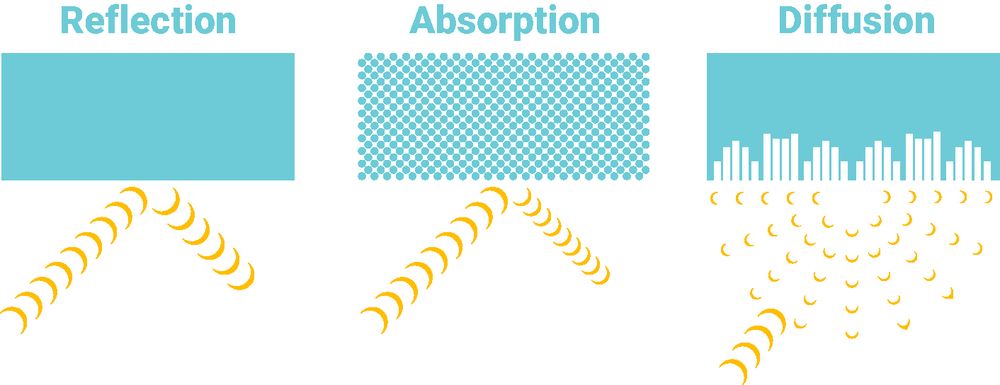
Use these two types of soundproofing to:
- Identify the weakest areas where sound will enter and treat those. Sound waves, like water, will travel the easiest path, so plug those up first.
- Isolate problem areas. Sometimes it's easier to treat the source before the sound waves reach the space you want to soundproof.
Best Soundproofing Material
Neighbors, barking dogs, cars – stop it before it reaches your ears. Adding these soundproofing materials or soundproofing products to your home or office will reduce the sound that breaks through easy entry points like windows, doors, and even walls.
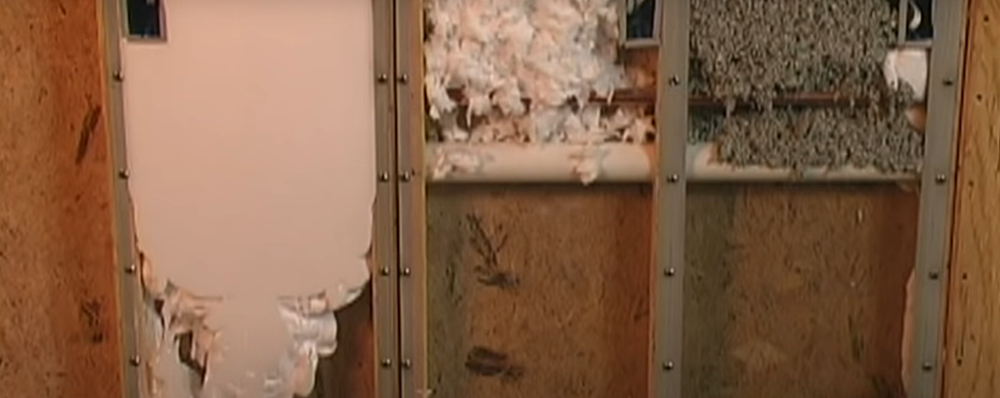
Soundproofing Spray Foam
Definition: Foam sprayed from a can that can be added as insulation to walls for insulation.
Best for: Existing walls, floors (between levels)
Mass Loaded Vinyl Sound Barrier
Definition: Heavy, versatile material that reduces noise wherever it is placed.
Best for: Hollow doors, between walls, floors, and ceilings, around pipes.
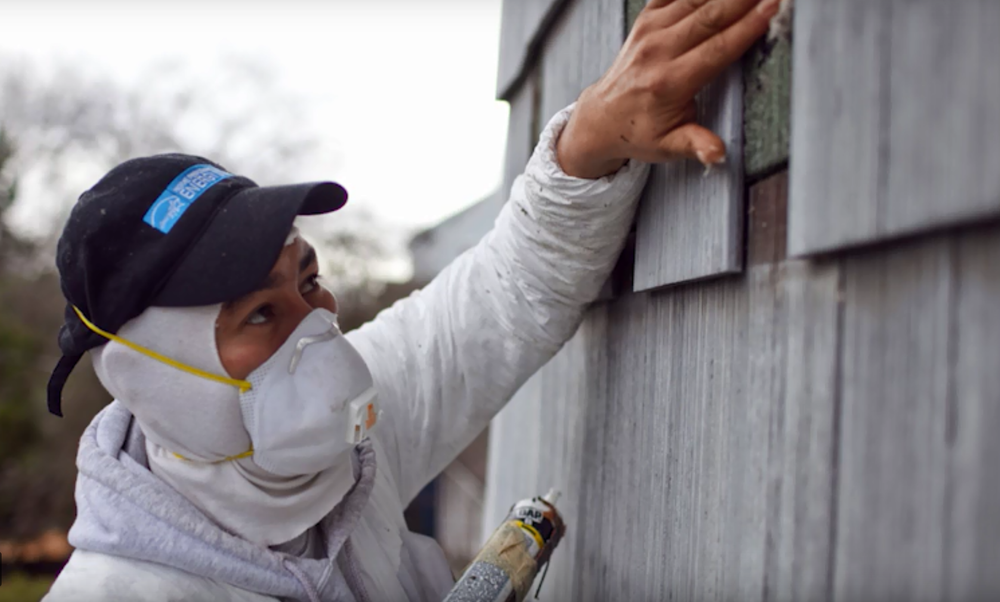
Acoustic Caulk
Definition: Like regular caulk, acoustic caulk seals gaps in windows, walls, and doors and blocks air. Acoustic caulk has added noise blocking properties to stop sound vibrations.
Best for: Cracks in window frames, doors, walls, ceilings.
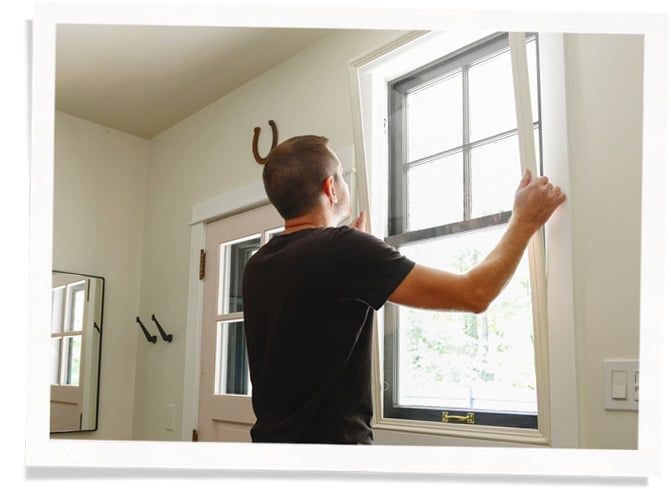
Acoustic Window Inserts
Definition: Soundproof window inserts that fit onto existing windows to air seal. Made from high-grade acrylic to both reduce and absorb sound.
Best for: Single-pane windows, historic windows. They work on double-pane windows, but you will get less noise reduction.
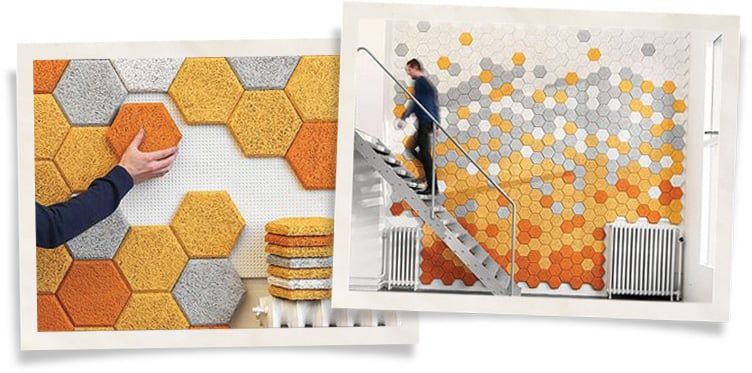
Definition: Decorative sound absorbing wall panels (yes, decorative, why should you settle for plain?) absorb noise within a space in an aesthetically pleasing way. They come prefabricated or available to customize with your own art.
Best for: Rooms where noise echoes – large, flat surfaces like walls with no windows.
Soundproof Underlayment
Definition: Soundproof underlayment is a rubber mat that you can place underneath other flooring materials to decrease sound transmission between levels. It can also eliminate noise from footsteps.
Best for: Creaking floors, upper levels.
Acoustic Floor Tiles
Definition: Acoustic floor tiles absorb sound during impact and from nearby sources.
Best for: Echoing room.
Comparing Most Effective Soundproofing Materials
Once you know where you are adding the soundproofing materials and what products you want, how can you compare which brand is the best? The best soundproofing material manufacturers will back up their product with a phone call discussing which types of noise it blocks or absorbs.
Many products also list their STC rating. STC, or Sound Transmission Class Rating, is a system that rates how well an assembly of building materials reduces or absorbs sound. The higher a product's STC rating, the better it is at soundproofing. See this STC rating chart for relative noise levels. It's a great way to compare products across brands and types.
The prices below are average for that type of window and may include installation costs. For example, the double-pane window cost is taken from Remodeling and is based on a 3×5 window. We tried to find windows that would have comparative STC ratings.
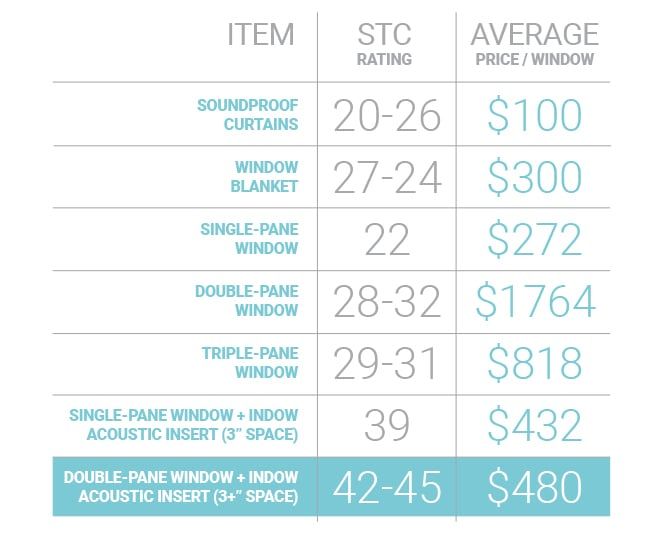
Watch Effective Soundproofing Materials in Action
Visit our YouTube channel for more tips on the best soundproofing material and how to most effectively block noise.

Let Us Help You
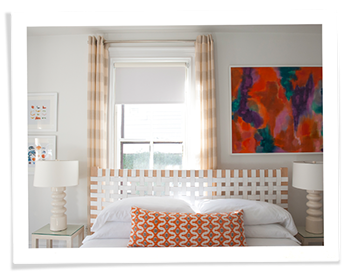
WE SHIP TO YOU!
You're one step closer to creating more comfort & quiet in your home.
We value safety and privacy. We will never share, sell, or rent your data to third parties not directly related to your purchase or consideration of our products. Read our full policy here.
Customer Reviews
Jen F
Worth the money!
Elizabeth H
For townhouse living, this solved my problem with noise from my neighbor's with my kitchen window. A considerable decrease of noise indeed! Measurements were a bit frustrating so I recommend using a laser measurement device and following directions to use a string for the diagonal. They look great and were easy to push into place. I highly recommend as an alternative to buying a new window.
Anonymous
Easy to install, and instantly stopped drafts and dampened outside noises very effectively!
Robert C
The process could've been smoother with the sending of the measuring kit. There was a delay with weather in Oregon but then it felt like my kit was still delayed due to other reasons. Most new homes (like mine) have textured paint and it can also be inside your window frames. I measured everything out but I still have little tiny gaps due to the texturing. Not indows problem but just be aware you made need to sand or fill in those gaps yourself to get a perfect seal. I did the acoustic grade inserts and they have reduced some noise but they will not completely block or significantly reduce road noise. This is most apparent with deep or lower frequencies like truck exhausts or modified street racing cars that are quite popular these days. Taking the inserts out to open your windows isn't an easy task. The little metal hook they provide needs to be either bigger or you can attach something to it as a way to leverage yourself. Overall the process was average. I think they're definitely a good option for weatherproofing and some sound reduction depending on the type of windows you have. I would purchase again.
Shelley C
The process for ordering and installing the Indow Widnow inserts was so easy. They sent the measuring information and it had great instructions. The inserts were delivered by UPS was crushed on one corner, but the company had packed them well, so there was no damage. We installed them the same day. It works best if you have two people completing the installation. We felt the results immediately and are glad we spent the money to make our home just a little more efficient.
Barry B
The insert fits like a glove and insulates the window! No more frost and condensation on the interior of the window! Thank you for an easy, effective and attractive fix!
Susan A
The support during the entire process was wonderful, thank you so much for the extra quiet space!
Volodymyr R
Very good good quality. Overall very satisfied with this product and service. Thanks
Jane H
Our home was built in 1913 and has beautiful old wavy glass single-paned windows. I’m so glad we were told about Indows and didn’t have to replace the original windows. We live in Canada but had no difficulty placing the order and were very impressed by how accurately the company met its deadlines, including cross border delivery. The Indows inserts blend in perfectly with our home and the existing window frames. You don’t see them unless you’re actually looking for them. But what we did notice was how much warmer the rooms feel the minute the inserts were installed! I can’t speak to any heating bill savings because they just went in this week, but our home feels much, much cozier. Our contractor who took all the measurements and installed the Indows says: “Excellent instructional videos: clear and informative. Very impressed with the design and the product. Overall, the ease of installation is quite impressive. Working with all the staff at the company was great – everyone was very helpful.” I’m already recommending this company to any of my friends who live in drafty older homes and want to reduce their heating/cooling bills and do some good for the environment.
Anonymous
Don't be afraid of buying an older home with single pane windows. This company has you covered. Their inserts are super high quality and fit well thanks to the laser measuring kit they send. Highly recommended!
Katie M
We purchased three Indows to reduce drafts and noise in our bedroom, which faces the street. The improvement was immediate. Our house was built in 1958 and although we have exterior storm windows we didn't want to replace the windows outright due to cost and architectural consistency. These were an excellent solution.
Matthew L
Indow inserts were easy to measure, order and install. They've provided great insulation for old single-pane and stained glass windows in an antique home. We can significantly feel how much better the home holds heat.
Ellis W
I ordered two Indow inserts for my home. They are doing a great job, entirely happy with them and the ordering process.
Elizabeth W
I can't say enough good things about this product and company. Our house is 101 years old and the sidelites next to our front door are single pane ancient wavy glass which means when it gets very cold (Chicago temps) we can have an inch of frost covering the INSIDE of our windows. I was desperately searching for a solution so our front vestibule was not so cold and a friend recommended Indow. The process could not have been simpler and the temperature difference it has made is off the charts.
Austin T
I have several historic single pane gridwork mullion windows. They're beautiful but have almost no thermal protection. Indows proved to be the perfect solution to preserve these windows while getting the thermal comfort we need. They were easy to install and work perfectly!